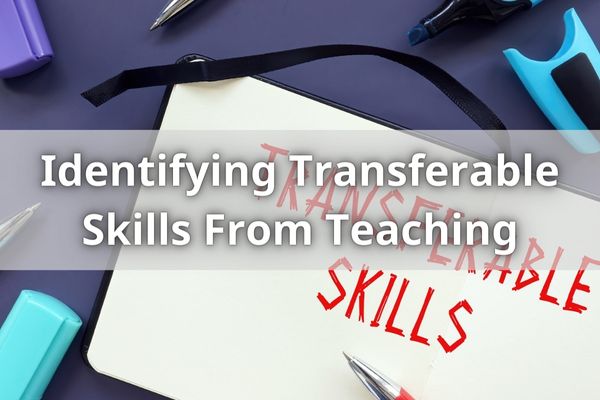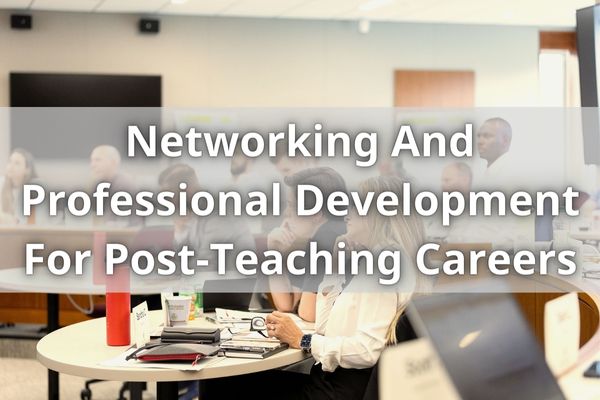Post Teaching Careers: Exploring Your Options For Educators
Are you a teacher looking for something new? Teaching can be an incredibly rewarding and fulfilling career, but at some point many of us start to feel like we want more from our lives. If you’re feeling that way, then post teaching careers may be the perfect option for you! It might be challenging to know where to start with so many options available; allow me to assist you in your endeavor.
I’ll discuss the many post-teaching occupations that are out there, the transferrable abilities from your prior teaching experience, and transitional advice in this article. Whether you’re looking for something in a similar field or completely unrelated to education, I’m here to show you all the options open to you.
So if you’re ready to take the next step in your professional life, read on!
Introduction
Leaving the teaching profession can be a difficult and emotional experience. After spending years in classrooms, developing relationships with students and colleagues, it can be hard for teachers to consider another career path.
This blog post will explore alternative options for those leaving the teaching profession, while recognizing the difficulties of transitioning away from something that has been such an important part of life.
It’s natural to feel overwhelmed or uneasy when considering new opportunities after investing so much time into being a teacher. It’s ok to take some time to adjust mentally and emotionally before moving forward on any decisions about future careers.
Many former teachers have found success by taking their expertise in education and applying it in different ways; this could include working as tutors, educational consultants, curriculum designers, etc.
There are many possibilities out there waiting to be explored!
Identifying Transferable Skills From Teaching

Having established the importance of introducing oneself to employers, it is now time to discuss how teaching experience can translate into skills and qualifications that are applicable in other professions.
Teaching involves a unique set of responsibilities and roles that require multiple skill sets. These often transferrable skills include:
- Communication and presentation skills
- Leadership and team building
- Problem-solving and critical thinking
- Creativity and adaptability
- Emotional intelligence and empathy
- Conflict resolution and negotiation
By having taught for many years in various settings such as schools or universities, one has gained invaluable knowledge on how to manage their time effectively while also developing strong organizational abilities.
In addition, teachers have developed interpersonal skills which allow them to build relationships with colleagues or students that may be beneficial when applying for jobs outside of education. Furthermore, through working with diverse groups of people who bring different experiences to the table, teachers learn to think critically about problems from all angles while understanding the emotions behind certain topics.
All these qualities make former educators highly employable in any industry they choose.
Education And Training-Related Career Paths
After teaching, many people decide to pursue education and training-related careers. These career paths can include roles such as an Education Administrator, Training & Development Manager, Education Consultant, Postsecondary Education Administrator, Museum Director, Human Resources Manager, Instructional Coordinator, Education Policy Analyst, School or Career Counselor and Project Manager.
Each of these jobs offers a different set of challenges that allow recent teachers to broaden their skillset while continuing work in the education field. For example, working as a Training & Development Manager would require knowledge from both HR professionals and educators alike; this job involves creating programs for employee development that take into account legal regulations as well as effectiveness for those being trained.
Working with postsecondary students allows one to help mold young minds through job placement services and policies on campus. Whether you’re looking to stay within the educational realm or try something new altogether after teaching — there are plenty of options available!
Best Jobs For Former Teachers With Specific Skills
The best jobs for former teachers depend heavily on their areas of expertise and the specific skills that they have acquired in their teaching careers.
Those with a background in presenting can pursue roles such as corporate trainer, HR learning & development specialist, or even customer success managers; these positions often offer salaries ranging from $50K to well over $100K depending on experience.
Those looking to leverage their teacher leadership skills may find education consultant positions particularly rewarding – these typically pay between $60K and $90K annually.
For those who are passionate about pedagogy, an educational sales representative could be an excellent choice – though pay varies greatly by region (anywhere from approximately $30k to upwards of $80K).
Those interested in history or art might consider museum education director roles which tend to range from around $40K up to nearly six figures depending on the size of the institution.
Writing positions are also great options for those with strong writing abilities; freelance writing rates vary widely but many full-time writers earn anywhere between $30K and $75K per year.
Project management is another option worth exploring if you’re self-motivated and enjoy problem solving. Salaries here usually fall into the same range as educational sales representatives ($30-$80K).
Educational toy companies provide exciting opportunities for those looking to combine their love of play with earning money – although wages will likely start out at the lower end of the spectrum ($20-$30/hour).
Finally, tutoring can make for a great side income while allowing teachers to stay connected with students – hourly rates average around $25/hour+.
Second Careers For Teachers Who Want Something Totally Different
If you’re a former teacher looking for something totally different, there are plenty of other career paths to explore. Everything from customer service and sales roles to copywriting or becoming an accountant can help you broaden your horizons and gain new skills and experiences.
And if you’re tech-savvy, jobs such as web development and IT support could also be options.
No matter what route you take, the key is to remain open minded and make sure that whatever job you choose will give you the opportunity to use the transferable skills gained during your teaching career. This could include communication, problem solving, organisation, presentation or leadership abilities – all qualities which employers in any industry value highly.
So don’t be afraid to put yourself out there and try something completely new!
Non-Teaching Jobs In Education

Sometimes, exploring non-teaching jobs within the realm of education can be a great way to use your knowledge and skills in the field. These positions often involve working with students or other educators, but from behind-the-scenes.
Let’s take a look at some popular post teaching careers!
- School guidance counselors are an important part of any school system, helping students set educational and career goals while providing emotional support.
- School administrators oversee day-to-day operations such as budgeting and personnel decisions.
- Instructional coordinators work closely with teachers to develop curriculum materials and assess student performance.
- Educational consultants offer advice on best practices for schools and districts across the country.
- Librarians not only manage collections, but also teach classes on research skills and help patrons find resources they need.
- College or university academic advisors guide undergraduate students through course selection and review graduation requirements.
All these roles require strong organizational and interpersonal skills, so if you’ve got those qualities in spades, consider looking into one of these post teaching paths!
Teaching-Related Jobs Outside The Classroom
Leaving the classroom to explore post-teaching careers doesn’t mean you have to leave education altogether.
There are plenty of teaching-related jobs outside the traditional classroom setting that can offer a new and exciting challenge for those who want to continue working in the field.
Coaches, corporate trainers, museum educators, and private tutors are just some of the job titles available.
But don’t forget about outdoor and experiential education roles too – adventure educators and wilderness therapy facilitators help people learn through unique activities such as rock climbing or canoeing.
All these positions require excellent communication skills, an understanding of educational techniques, and patience with students.
Plus they come with great rewards like making a difference in someone’s life or feeling proud after helping someone reach their goals!
Remote And Online Opportunities For Former Teachers
It’s no secret that the teaching industry has seen a dramatic shift in recent years. As more classrooms transition to virtual and distance learning settings, teachers need to adjust their approaches too.
But it doesn’t have to be all doom and gloom! There are plenty of remote and online opportunities available for former teachers who want to stay connected with education while being able to work from home.
From online tutoring or coaching, content creation for e-learning platforms, social media management for educational institutions or ed-tech companies, freelance writing or editing educational materials, and even virtual education consulting — there is an abundance of potential jobs out there for those looking for new ways to make use of their experience and skills as educators.
With some research and creativity on your part, you can find yourself well suited to jump into these innovative roles today.
Entrepreneurial Ventures For Former Teachers
Becoming an entrepreneur may be both thrilling and terrifying for a former teacher. You are accustomed to following a predetermined curriculum that specifies what to teach when and how much work should be assigned to pupils. But, you now have the chance to take charge of your own career by investigating numerous entrepreneurial endeavors.
Here are some ideas for getting started:
Creative Ventures:
- Start a tutoring or coaching business
- Develop educational products or services
- Launch a blog, podcast, or YouTube channel focused on education
Other Opportunities:
- Become a mentor in your field
- Offer consulting services to schools/teachers
- Create online courses related to teaching topics
You don’t need any special qualifications or certification – just the willingness to put in the time and effort required to create something unique and valuable. With hard work and dedication, you can make your dreams of entrepreneurship come true!
Volunteering And Community Involvement

Moving away from entrepreneurial ventures, another great way for former teachers to continue making an impact in education is through volunteering and community involvement.
Opportunities abound to mentor or coach youth programs, contribute to educational non-profit organizations, participate in local school boards or committees, and even explore international volunteer work or teaching abroad.
For instance, if you’re looking for a meaningful experience that can also be quite rewarding, check out the plethora of opportunities available with Teach For All which partners with 40 independent social enterprises around the world dedicated to providing quality education for all children.
Through their global network, volunteers can become part of various initiatives such as working in classrooms as tutors or mentors; leading professional development sessions for teachers; creating curriculum materials; helping write grant proposals; and much more!
In addition to offering hands-on experiences like this one, there are plenty of other unique ways to get involved at the local level — whether it’s coaching sports teams or joining your community’s PTA organization.
No matter what route you choose though, these types of activities allow former teachers to stay connected with their passion while continuing to make a difference in the lives of students everywhere!
How To Make The Transition From Teaching To A Second Career?
Making the transition from teaching to a second career can be daunting and overwhelming. It requires taking stock of your professional traits and skills, being open to new opportunities, gaining experiences through networking, and choosing a path that may require additional education or certifications.
Once you have identified what kind of career you want to pursue next, it’s important to start gathering references, refining your resume, and brushing up on interviewing techniques so you are prepared for any interviews that come your way.
Staying persistent and continuing with this process until the right opportunity is found is key in making the transition successful. Don’t forget to take advantage of all available resources within your network such as mentoring programs or professional organizations who specialize in assisting people transitioning careers.
With some hard work and dedication to reach your goals, you’ll be able to make the move from teaching into your new chosen career field!
Networking And Professional Development For Post-Teaching Careers

Networking and professional development are essential for pursuing post-teaching careers. It can be intimidating to start networking, but there are plenty of ways to get involved in the community. I’ve found that joining relevant professional organizations or associations is a great place to start. Not only do they provide opportunities for career growth, but it also helps build strong relationships with other professionals in your field.
Additionally, attending conferences, workshops, or seminars is another way to learn about new trends and best practices while networking with likeminded people. When it comes to online networking, social media platforms such as LinkedIn are invaluable. You can follow industry experts, share your work, participate in discussions and even find job postings from potential employers all within one platform!
Staying updated on industry trends and best practices through blogs or newsletters is also key for staying ahead of the competition.
Taking initiative by getting involved in different activities will help you stand out from the crowd and enhance your credibility within any chosen profession. So don’t be afraid to take advantage of every opportunity that comes your way!
Conclusion
Reflecting on the journey of career exploration can be an enlightening experience. It is important to take into account your skills, passions and interests when looking for post-teaching careers as these are all essential components that will help determine what kind of job you want and how successful you’ll be in it.
Networking with other professionals and keeping up a continuous professional development will also play a key role in finding new opportunities. At the same time, it’s important to remember that there is always the possibility of returning to teaching if need be or desired.
Ultimately, exploring different kinds of career paths should not only be about gaining more knowledge but also about personal growth and learning from different experiences. Taking this approach can ensure that no matter where life takes us after leaving teaching, we have done our best to make informed decisions for ourselves.







